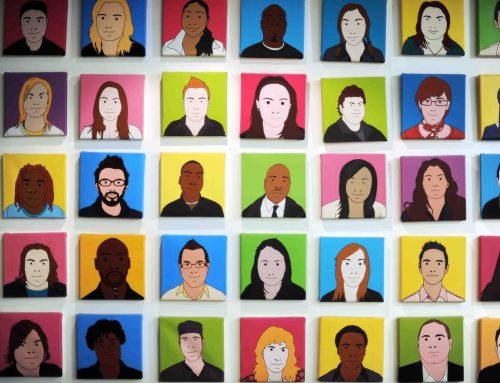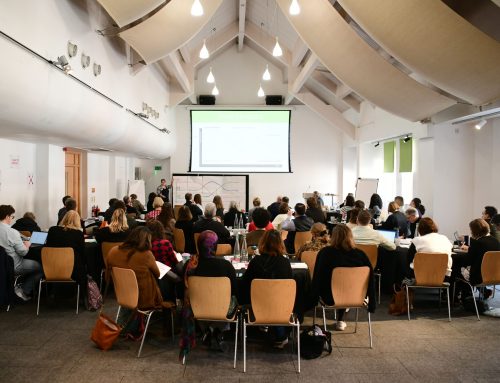T
he NCIA Action Learning Programme came together for its final in-person event in Birmingham in March. It was a day designed not just to mark the end of a journey but to serve as a launchpad for continued civic engagement, innovation, and sector-wide learning.
Over the past 18 months, partnerships consisting of universities, civic and community organisations have collaborated, reflected, and experimented, worked through common challenges, trialed new approaches with funding, and engaged in meaningful conversations.
The event was designed as a space to consolidate learning, explore new tools, and set the stage for the future of civic work.
Exploring the Future of an Engaged University
Sophie Duncan and Paul Manners NCCPE co-directors led a session on the engaged university of the future, what does this look like through a civic lens? Attendees explored the current landscape, emerging trends, and future possibilities for civic engagement and activity. Findings from this activity will feed into the NCCPE engaged futures project, find out more and sign up.
Showcasing Learning and Tools for the Sector
One of the core objectives of the action learning programme has been to develop practical tools that address challenges faced by civic practitioners. We presented two key resources:
- The Place Navigator: A tool designed to help institutions map stakeholders, partnerships, and key actors in their civic ecosystems.
- The Outcomes Framework: A framework to better measure and articulate the impact of civic work.
Interactive taster sessions allowed participants to engage with these resources firsthand, offering feedback that will inform further refinement.

Action Learning Programme participants, March 2025
Shaping the Future: Open Space Discussions
The event finished with Open Space discussions, allowing participants to shape the agenda based on their interests. Themes that emerged included:
- Measuring Civic Impact, where are we now?
- The Right to Food University
- Working with business to influence their place-based working
- Civic leadership development
- Community driven research
- The intersection of policy engagement and the civic agenda
This format provided an opportunity for attendees to co-design future collaborations, ensuring that the momentum of the programme continued beyond the event.

Action Learning Programme participants, March 2025
Closing Reflections
As the event came to a close, we reinforced a key message: this is not the end but rather the beginning of a new phase of mobilisation and impact. Attendees were encouraged to maintain connections, share their insights, and continue shaping the civic engagement landscape together.
A huge thank you to everyone who contributed their time, energy, and expertise to this programme. We look forward to seeing how these learnings translate into action and impact across the sector!
T
he NCIA Action Learning Programme came together for its final in-person event in Birmingham in March. It was a day designed not just to mark the end of a journey but to serve as a launchpad for continued civic engagement, innovation, and sector-wide learning.
Over the past 18 months, partnerships consisting of universities, civic and community organisations have collaborated, reflected, and experimented, worked through common challenges, trialed new approaches with funding, and engaged in meaningful conversations.
The event was designed as a space to consolidate learning, explore new tools, and set the stage for the future of civic work.
Exploring the Future of an Engaged University
Sophie Duncan and Paul Manners NCCPE co-directors led a session on the engaged university of the future, what does this look like through a civic lens? Attendees explored the current landscape, emerging trends, and future possibilities for civic engagement and activity. Findings from this activity will feed into the NCCPE engaged futures project, find out more and sign up.
Showcasing Learning and Tools for the Sector
One of the core objectives of the action learning programme has been to develop practical tools that address challenges faced by civic practitioners. We presented two key resources:
- The Place Navigator: A tool designed to help institutions map stakeholders, partnerships, and key actors in their civic ecosystems.
- The Outcomes Framework: A framework to better measure and articulate the impact of civic work.
Interactive taster sessions allowed participants to engage with these resources firsthand, offering feedback that will inform further refinement.

Action Learning Programme participants, March 2025
Shaping the Future: Open Space Discussions
The event finished with Open Space discussions, allowing participants to shape the agenda based on their interests. Themes that emerged included:
- Measuring Civic Impact, where are we now?
- The Right to Food University
- Working with business to influence their place-based working
- Civic leadership development
- Community driven research
- The intersection of policy engagement and the civic agenda
This format provided an opportunity for attendees to co-design future collaborations, ensuring that the momentum of the programme continued beyond the event.

Action Learning Programme participants, March 2025
Closing Reflections
As the event came to a close, we reinforced a key message: this is not the end but rather the beginning of a new phase of mobilisation and impact. Attendees were encouraged to maintain connections, share their insights, and continue shaping the civic engagement landscape together.
A huge thank you to everyone who contributed their time, energy, and expertise to this programme. We look forward to seeing how these learnings translate into action and impact across the sector!






